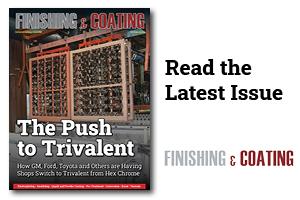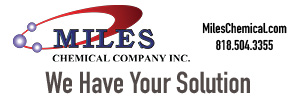Metal surface finishing is critical in many manufacturing processes, providing durability, corrosion resistance, and aesthetic appeal.
 Alkesh PatelAmong the various finishing techniques, anodizing stands out for its ability to enhance the performance and longevity of metal products.
Alkesh PatelAmong the various finishing techniques, anodizing stands out for its ability to enhance the performance and longevity of metal products.
Metal surface finishing plays a crucial role in modern manufacturing, enhancing the functionality and appearance of products. Among the many finishing processes, anodizing stands out for its ability to improve durability, corrosion resistance, and aesthetic appeal. However, for job shops handling diverse and high-volume projects, managing the anodizing process efficiently can be challenging. Enter anodizing software—a transformative solution that streamlines operations, ensures quality, and maximizes efficiency.
However, mastering the anodizing process in job shops can be complex, requiring precise control and efficiency. This is where anodizing software becomes indispensable.
Why Anodizing Matters in Job Shops
Anodizing involves creating a protective oxide layer on the surface of metals, primarily aluminum. This process improves wear resistance, prevents corrosion, and allows vibrant color finishes. For job shops, the challenge lies in maintaining consistency and meeting high-quality standards across diverse projects.
Anodizing software helps job shops overcome these challenges by streamlining the process, automating controls, and ensuring compliance with industry standards.
Key Benefits of Anodizing Software in Job Shops
- Enhanced Process Control: Anodizing software monitors and regulates critical parameters like voltage, temperature, and bath chemistry in real time, ensuring consistent quality across every batch.
- Improved Operational Efficiency: The software minimizes errors and speeds up production cycles by automating repetitive tasks and reducing manual intervention.
- Comprehensive Data Management: The software tracks and records process data, making it easier to generate reports for audits, client presentations, and internal analysis.
- Customization for Specific Needs: Modern anodizing software is highly customizable, catering to the unique requirements of different industries, such as aerospace, automotive, and consumer electronics.
- Cost Optimization: By reducing waste, minimizing rework, and optimizing resource utilization, the software contributes to significant cost savings over time.
Understanding Anodizing: A Vital Metal Finishing Process
Anodizing is an electrochemical process that enhances the natural oxide layer on metals, primarily aluminum. This protective coating provides numerous benefits:
- Corrosion Resistance: The oxide layer shields the metal from environmental elements, significantly extending its lifespan.
- Improved Wear Resistance: Anodized surfaces can endure greater mechanical wear, making them ideal for industrial applications.
- Aesthetic Flexibility: The porous nature of the anodized layer allows it to absorb dyes, enabling a wide range of color options.
- Environmentally Friendly: Anodizing is relatively sustainable and non-toxic compared to other coating methods.
Despite its advantages, anodizing is a complex process requiring precise control over variables such as bath composition, temperature, voltage, and immersion time. Even minor deviations can lead to inconsistent results, rework, or waste, posing significant challenges for job shops.
Challenges in Anodizing for Job Shops
Job shops often operate in fast-paced environments, handling diverse projects for various industries such as aerospace, automotive, and consumer electronics. Common challenges include:
- Maintaining Consistency: Achieving uniform quality across different batches is difficult due to variations in raw materials, process parameters, and environmental factors.
- Time-Intensive Operations: The anodizing process involves multiple steps, from surface preparation to sealing, each requiring meticulous attention.
- Complex Data Management: Tracking process parameters, maintaining records for audits, and ensuring traceability demands robust systems.
- Regulatory Compliance: Industries like aerospace and medical devices impose stringent quality standards, necessitating precise documentation and control.
- Resource Utilization: Inefficient use of chemicals, energy, and time can lead to increased costs and reduced profitability.
FAQs
- What is anodizing software? Anodizing software is a digital tool designed to automate and manage the anodizing process, ensuring precision, efficiency, and compliance with industry standards.
- How does anodizing software improve quality? It ensures that critical parameters like bath temperature, voltage, and immersion time are maintained within specified ranges, leading to consistent and high-quality finishes.
- Is anodizing software suitable for small job shops? Yes, anodizing software is scalable and can be tailored to fit the needs of both small and large job shops.
- Can anodizing software help with regulatory compliance? Absolutely. The software maintains detailed records of the anodizing process, making it easier to meet regulatory requirements and prepare for audits.
- How does anodizing software impact ROI? By enhancing efficiency, reducing waste, and improving product quality, anodizing software delivers a high return on investment through cost savings and increased customer satisfaction.
Conclusion
The anodizing process is a cornerstone of metal surface finishing, but achieving excellence requires more than traditional methods. With anodizing software, job shops can streamline operations, maintain top-tier quality, and stay competitive in a demanding market. Embrace this technology to unlock new levels of efficiency and precision in your anodizing processes.
Alkesh Patel is the President of ProPlate, an ERP software program that helps shops and facilities become more efficient and precise in their surface-finishing processing. Visit https://proplate.pro.



































